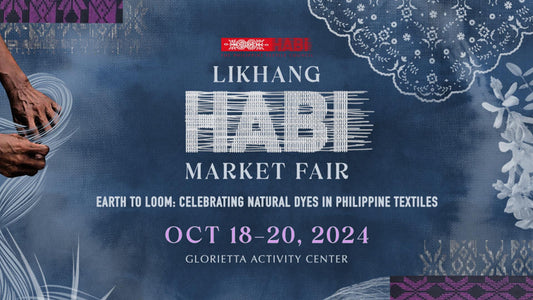Already honored locally multiple times for her work, Aklan-based piña weaver Raquel R. Eliserio is now also honored internationally for her creations.
In February, she won the Global Eco Artisan Awards 2021 in the textile category. Organized by eco-artisanal fashion brand AGAATI, the award “recognizes and promotes the best in eco-artisanal crafts created by makers from all over the world.” Her design, made from piña-woven fiber, won among entries from thirty-one countries.

It took two months to weave her entry to the competition.
Aside from her victory in the international competition, Ms. Eliserio is also a consistent winner in the annual Lourdes Montinola Piña Weaving competitions organized by HABI: The Philippine Textile Council.
Born in Balete, Aklan, Ms. Eliserio grew up in a family of pineapple-fiber (piña) weavers. Pineapple-weaving is part of their community’s cultural heritage.
“I grew up seeing my grandparents doing this craft, from farming the Red Spanish pineapple plant, manually extracting the fibers from leaves, and then weaving it,” Ms. Eliserio told BusinessWorld in an e-mail.
As a child, the process of weaving piña fiber—which she referred to in the online interview as the “queen of Philippine textiles”—fascinated her and she was encouraged to learn it.
The leaves of the Red Spanish pineapple are scraped by hand with shards of porcelain and sharpened coconut shell to produce the finest filaments of piña fiber, Ms. Eliserio explained.
“It is knotted by hand from end to end and by its thread sizes to ensure the quality of continuous knotted pineapple fibers for weaving,” she said.
The old tradition of suksuk or creating an inlay pattern, Ms. Eliserio explained, is a technique where “the warp is counted according to desired pattern and pulled up using cotton threads and numbered fern sticks.” (Warp threads run vertically, while the weft threads run horizontally from the edge of the fabric.) More piña fibers are inserted through the warp and weft to create designs embedded in the fabric—this is used in lieu of embroidering the fabric. This process created the ecru, tissue-like appearance of Ms. Eliserio’s winning design.
Thriving Through Support and Education
The pandemic put a temporary stop to the weaving within their community. However, prior to the lockdown, Ms. Eliserio said that the main challenge for the industry was “how to make this modern world love the traditional crafts.”

Reintroducing piña weaving and sharing her skills through training and workshops have been part of Ms. Eliserio’s advocacy for the industry.
“I partnered with different government agencies and private sectors to train different communities in Aklan,” Ms. Eliserio explained.
Through the Enhanced School of Living Tradition program of the National Commission of Culture and the Arts, Ms. Eliserio teaches local culture and traditions as a cultural master using non-formal and practical demonstrations.
“I [want to bring them back to] my childhood, when colored synthetic threads were not available in the market and my grandparents only used the indigenous piña fibers to design the fabrics,” she said.
Ms. Eliserio also participates in the National Museum of the Philippines’ Hibla ng Lahing Filipino travelling exhibition, which includes exhibits and demonstrations abroad.
As the winner of the Global Eco Artisan Awards 2021, Ms. Eliserio gains free promotion of her design and products, marketing on social media, as well as a design consultancy with the founder and design head of AGAATI, Saloni Shrestha.
“Buying and supporting the weaves of different communities are ways to keep their cultures and traditional weaving alive. It is also why we are always thrilled to continue the passion in our own craft,” she said.
For more information on Raquel R. Eliserio’s products, visit https://www.facebook.com/raquelspinacloth. — Michelle Anne P. Soliman
Read original article
Photos courtesy of Raquel Eliserio




